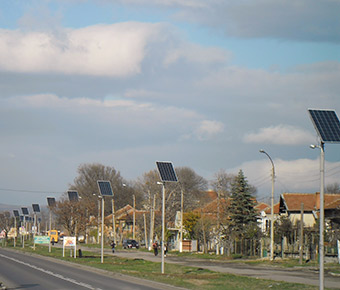To enhance the quality of life of its citizens sustainably, the municipality of Straldzha in Bulgaria installed a system of street lights that runs entirely on renewable energy.
- 20 February 2019
The project achieves social equality in the region by reducing the contrast and differences between city life and life in small towns and villages. The use of free and eco-friendly solar energy limited the harmful emissions of greenhouse gases in the atmosphere. It contributed to the improvement of ecological parameters and, as far as possible, reduced the effect of climate change. The residents are pleased that municipal authorities are caring for their safety.
The increasing cost of electricity and maintenance has resulted in a steady decrease in the number of functional street lights in the municipality of Straldzha in Bulgaria. Not only has this jeopardised the immediate safety of pedestrians and automobiles, but it has also contributed to the long-term problem of young people leaving the villages to live and work in the more modern urban centres.
To improve both the safety and quality of life for the citizens of Straldzha, this EU-funded project set out to build a new infrastructure running on the abundant renewable energy sources found throughout the region. By replacing 378 electrical street lamps with modern, solar-powered lights, the communities have saved 162 540 kW for every 4 300 hours of operation. Furthermore, CO2 emissions have been reduced by 96 tonnes per year. Now, thanks to better lighting in the streets, citizens feel safer and the future looks brighter for Straldzha.
Enlightening approach
Straldzha is located 20 km north-east of Yambol, the region’s capital. The municipality covers an area of 676 km2 and includes 22 settlements. The entire area was connected to an old and obsolete street-light infrastructure that was often out of order, could no longer be repaired and consumed too much energy. The project installed 220 photovoltaic street lights in four Bulgarian towns and villages and 158 photovoltaic lamps in Kavakli, Turkey. The installed lighting infrastructure covers the main arterial roads and those streets with the highest levels of pedestrian and vehicle traffic.
Although the new lighting required a larger initial investment – as the system runs completely on renewable energy – it uses less power and requires less maintenance and replacement. As a result, the initial costs are being recovered while, over time, the system is cutting costs. In fact, the lifespan for the photovoltaic panels is 20 years – far longer than the short lifespan of a traditional electric bulb.
Greater mobility and quality of life
The project successfully used existing natural resources to construct a reliable and energy-efficient street lighting system. The photovoltaic panels installed on metal poles transform sunlight into electricity which is stored in batteries and, at night, is used to power 25W lights. Each charge is sufficient to provide lighting for three nights.
Overall, the project has improved mobility throughout the municipality and increased the overall attractiveness of living and working there. Since its launch four years ago, the lighting system has worked smoothly, saving substantial sums of money which has since been reinvested into other social-improvement projects, such as road maintenance.
Total investment and EU funding
Total investment for the project “Clean Energy for Lighting in Public Places in Straldzha and Kavaklı” is EUR 674 908, with the EU’s Instrument for Pre-Accession Assistance (IPA) contributing EUR 573 672 through the “Bulgaria-Turkey IPA Cross- Border Cooperation Programme” Operational Programme for the 2007-2013 programming period.

